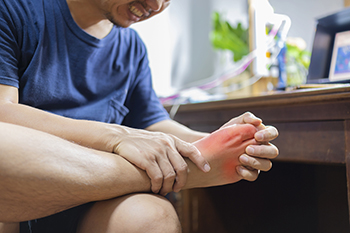Items filtered by date: August 2023
Using Minimally Invasive Surgery to Manage Foot and Ankle Problems

In recent years, minimally invasive surgery has garnered increasing attention as a potential solution for correcting foot and ankle deformities. Unlike traditional open procedures that require large incisions, minimally invasive surgery involves small, precise incisions. The anticipated advantages of this type of surgery include the preservation of blood supply, reduced harm to adjacent soft tissues, and a decreased incidence of wound complications. Minimally invasive surgical techniques can be performed for deformities such as flat feet, bunions, and hammertoe surgeries. If you have foot or ankle deformities, it is suggested that you make an appointment with a podiatrist to discuss whether minimally invasive surgery can help you.
Foot surgery is sometimes necessary to treat a foot ailment. To learn more, contact one of our podiatrists of Waterbury Podiatry Consultants. Our doctors will assist you with all of your foot and ankle needs.
When Is Surgery Necessary?
Foot and ankle surgery is generally reserved for cases in which less invasive, conservative procedures have failed to alleviate the problem. Some of the cases in which surgery may be necessary include:
- Removing foot deformities like bunions and bone spurs
- Severe arthritis that has caused bone issues
- Cosmetic reconstruction
What Types of Surgery Are There?
The type of surgery you receive will depend on the nature of the problem you have. Some of the possible surgeries include:
- Bunionectomy for painful bunions
- Surgical fusion for realignment of bones
- Neuropathy decompression surgery to treat nerve damage
Benefits of Surgery
Although surgery is usually a last resort, it can provide more complete pain relief compared to non-surgical methods and may allow you to finally resume full activity.
Surgical techniques have also become increasingly sophisticated. Techniques like endoscopic surgery allow for smaller incisions and faster recovery times.
If you have any questions please feel free to contact our offices located in Waterbury and Southington, CT . We offer the newest diagnostic and treatment technologies for all your foot and ankle needs.
Understanding Gout and Identifying Risks and Effective Treatments

Gout is a form of inflammatory arthritis caused by excess uric acid in the blood, leading to the formation of urate crystals in the joints. These sharp crystals trigger sudden, severe pain, redness, and swelling, commonly affecting the big toe. Anyone can develop gout, but certain factors can increase the risk. Men are more susceptible to getting gout than women, and individuals with a family history of gout have a higher likelihood of developing this condition. Lifestyle choices such as consuming a diet rich in purines, excessive alcohol intake, obesity, and certain medications can also contribute to gout. There are effective treatments that aim to alleviate pain during attacks and prevent future flare-ups. Nonsteroidal anti-inflammatory drugs, corticosteroids, and colchicine are commonly prescribed to manage gout symptoms. Long-term management involves lifestyle modifications, including dietary changes, weight loss, and limiting alcohol consumption. With proper management and awareness of risk factors, individuals with gout can lead healthier, more comfortable lives. If you have gout attacks, it is strongly suggested that you are under the care of a podiatrist who can help you to deal with this condition.
Gout is a painful condition that can be treated. If you are seeking treatment, contact one of our podiatrists from Waterbury Podiatry Consultants. Our doctors will treat your foot and ankle needs.
What Is Gout?
Gout is a form of arthritis that is characterized by sudden, severe attacks of pain, redness, and tenderness in the joints. The condition usually affects the joint at the base of the big toe. A gout attack can occur at any random time, such as the middle of the night while you are asleep.
Symptoms
- Intense Joint Pain - Usually around the large joint of your big toe, and it most severe within the first four to twelve hours
- Lingering Discomfort - Joint discomfort may last from a few days to a few weeks
- Inflammation and Redness -Affected joints may become swollen, tender, warm and red
- Limited Range of Motion - May experience a decrease in joint mobility
Risk Factors
- Genetics - If family members have gout, you’re more likely to have it
- Medications - Diuretic medications can raise uric acid levels
- Gender/Age - Gout is more common in men until the age of 60. It is believed that estrogen protects women until that point
- Diet - Eating red meat and shellfish increases your risk
- Alcohol - Having more than two alcoholic drinks per day increases your risk
- Obesity - Obese people are at a higher risk for gout
Prior to visiting your podiatrist to receive treatment for gout, there are a few things you should do beforehand. If you have gout you should write down your symptoms--including when they started and how often you experience them, important medical information you may have, and any questions you may have. Writing down these three things will help your podiatrist in assessing your specific situation so that he or she may provide the best route of treatment for you.
If you have any questions, please feel free to contact our offices located in Waterbury and Southington, CT . We offer the newest diagnostic and treatment technologies for all your foot care needs.
